Diving into the question," what software do real estate agents use?" It's essential to break down each software to its simplest nature to understand its features and benefits for different businesses.
Real estate software allows companies to establish a streamlined platform where property listings and client data can be stored and organized with the goal of turning that crucial information into usable strategies. However, businesses should first understand the importance of learning what software do real estate agents use to help digest the different functionalities.
Our team at Aloa specializes in developing customized software solutions for various industries and business types. With that, we've come up with a list of contenders that answers the question, "What software do real estate agents use?". Each solution on our list carefully considers the trends in the real estate industry and the essential features professionals need to ramp up their potential!
In this blog post, we will dive into the common features to watch for in different highly sought-after real estate software. We shall also discuss how to utilize those platforms as a method to help grow and scale your business opportunities to increase customer engagement and craft a solid foundation for your company.
Let's begin.
What Software Do Real Estate Agents Use
Looking into what software do real estate agents use includes essential features and capabilities such as property management, customer relationship management (CRM), lead generation and tracking, document management, transaction management, and marketing automation.
These are just a few key functionalities that real estate agents rely on to streamline their business operations and stay ahead in a competitive market. With the right set of features and capabilities, the software used by real estate agents can significantly enhance their productivity and efficiency.
Best Overall Software Used by Real Estate Agents
Exploring what software do real estate agents use for their day-to-day operations, the best overall choice is often a comprehensive customer relationship management (CRM) software. This type of software allows real estate agents to manage their leads, client information, and transactions effectively, all in one centralized location. Aside from that, having additional capabilities ranks these platforms as the best overall software used by real estate agents.
1. Real Estate Bees – Best Marketing and Networking Platform
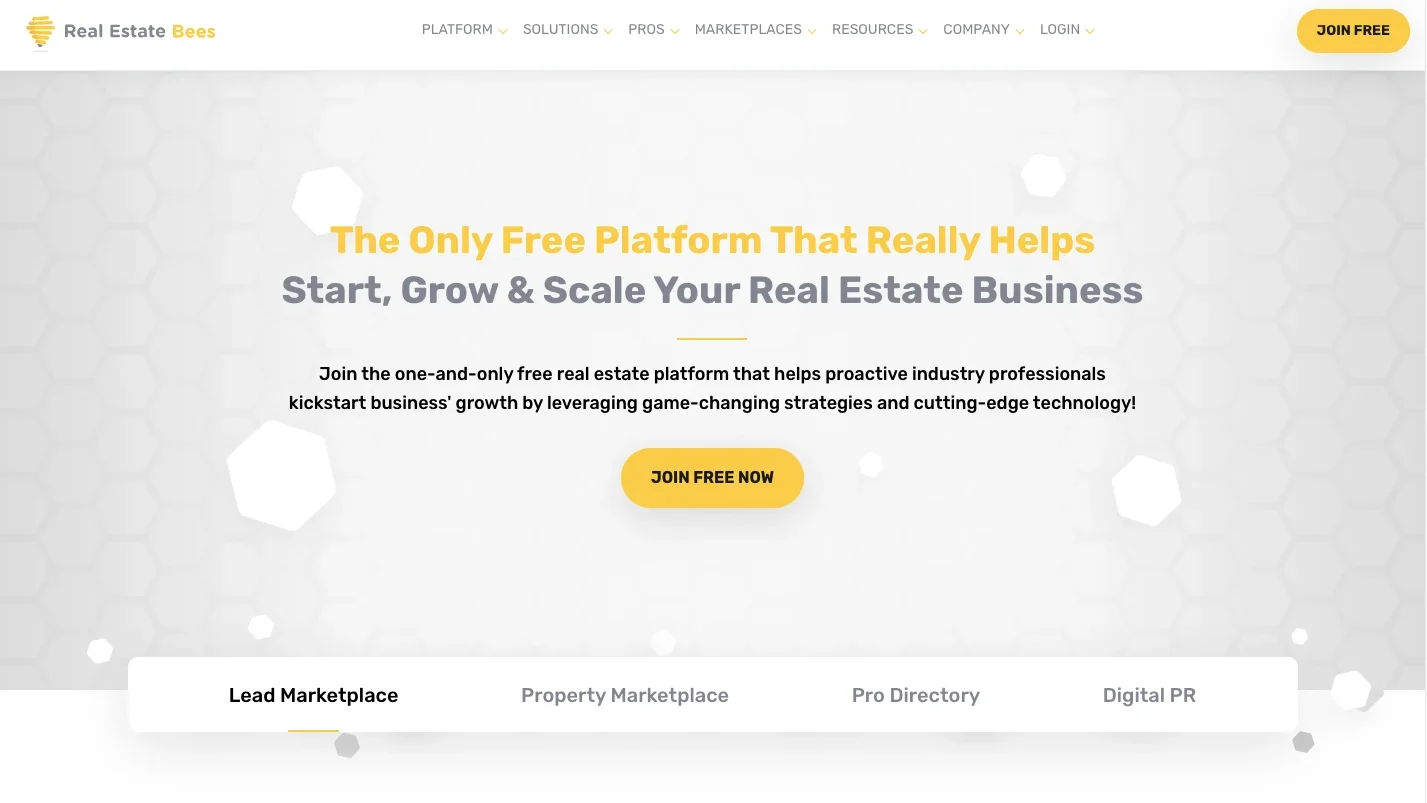
Real Estate Bees (REB) is an all-in-one platform that empowers industry professionals with technology solutions and the knowledge required to grow their real estate business. The platform features services for all types of real estate professionals, including realtors, investors, lenders, attorneys, appraisers, real estate photographers, and more. To cater to all its users, Real Estate Bees is equipped with numerous tools and resources.
Some main offerings include a lead marketplace, a property marketplace, the ability to join and access an industry professionals’ network and email blasting services. Being an online SaaS platform, Real Estate Bees can be used on any device, including PCs, mobile phones, iPads, and Android tablets.
Notable Features of Real Estate Bees
- Pro Directory: Real estate agents can join REB’s network of industry professionals to put themselves in front of highly targeted local audiences seeking their services. Joining the Real Estate Bees Pro Directory and building a business profile is free. However, you must be active on the platform to get listed among the top 10 pros in your area.
- Lead Marketplace: REB provides a lead generation solution that lets various types of professionals — from agents and investors to attorneys and property managers — purchase and sell leads. To get started, register on the platform, set your criteria, and start receiving leads that fit your requirements.
- Property Marketplace: The REB Property Marketplace lets you sell, buy, and lease real estate for yourself or your clients. You can list properties on the marketplace to tap into the company’s vast user base, including a nationwide network of investors, agents, and other pros.
- DispoBlast: REB’s advanced email blast software offers agents, wholesalers, and investors a powerful tool to market properties for sale. It boasts an impressive 98% deliverability rate. The company also uses a comprehensive double opt-in verification procedure to ensure that only those who deliberately subscribed to your list receive emails. As a result, agents enjoy the industry’s highest email open rates.
Real Estate Bees Price Plans
Adding your business to the Pro directory is free of charge, as well as getting leads when your potential clients contact you via your directory profile. The price per lead on the Lead Marketplace varies depending on the location and lead type. It can range from $20 to $300 per lead.
It’s free to list one property per month on the REB Marketplace. But to list more than that, you’ll need to subscribe to one of the paid plans, which start from $37 per month and go up to $300 per month. As for DispoBlast, the pricing starts at just $0.25 per contact and increases depending on the number of recipients your email will be sent to.
2. Real Geeks - Top All-in-one Real Estate Software for Agents
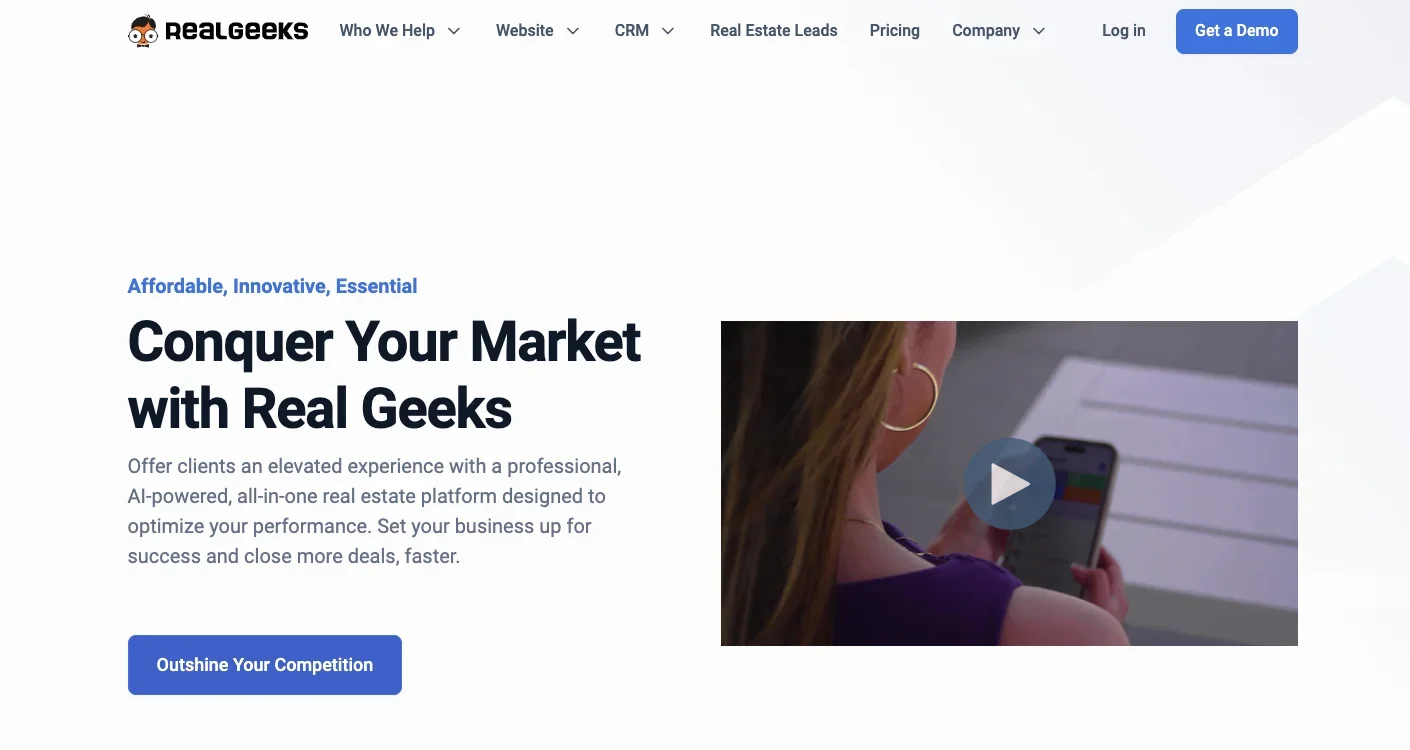
Real Geeks is an all-in-one real estate solutions company with a strong emphasis on building sales and improving market reach. Businesses can rely on Real Geeks' determination to build on lead generation, SEO-friendly sites, and automation tools to attract as many potential clients as possible, regardless of the size and scope of your real estate agency.
Features such as a dedicated CRM, Facebook & Google PPC Management, and a fully-developed integrated IDX website development are all included to aid growing real estate companies in establishing a strong foothold in formulating strong strategies. Businesses also gain client-facing applications for both Android and IOS platforms to complete their software development needs.
Notable Features of Real Geeks
- Complete End-to-End Development: Ensure that all avenues of real estate software development are taken care of with Real Geeks' all-in-one end-to-end solutions.
- Effective Lead Generation: One of the main challenges for real estate agents is generating leads. Real Geeks addresses this issue by providing comprehensive lead-generation tools.
- Streamlined Communication: Communication is vital in the real estate industry, and Real Geeks recognizes the need for streamlined communication. Additionally, their client-facing applications for Android and IOS platforms enable agents to stay connected with clients on the go, providing excellent customer service at all times.
- User-friendly Interface: Real Geeks understands that real estate agents have varying levels of technical expertise. That's why they have designed their software with a user-friendly interface, making it easy for agents to navigate and utilize all its features.
Real Geeks Pricing Plans
Interested customers can request a demo for all Real Geeks' services to determine if their tools fit your company. A complete custom pricing plan is offered once the demo period times out.
Real Geeks is a fantastic option for companies that want to have all the tools necessary to help scale their real estate business to its maximum potential. Startups can also use this opportunity to establish a website, mobile application, or even for Real Geeks' numerous data sources to start their business the right way.
3. Realty Juggler - Comprehensive Real Estate CRM Solution
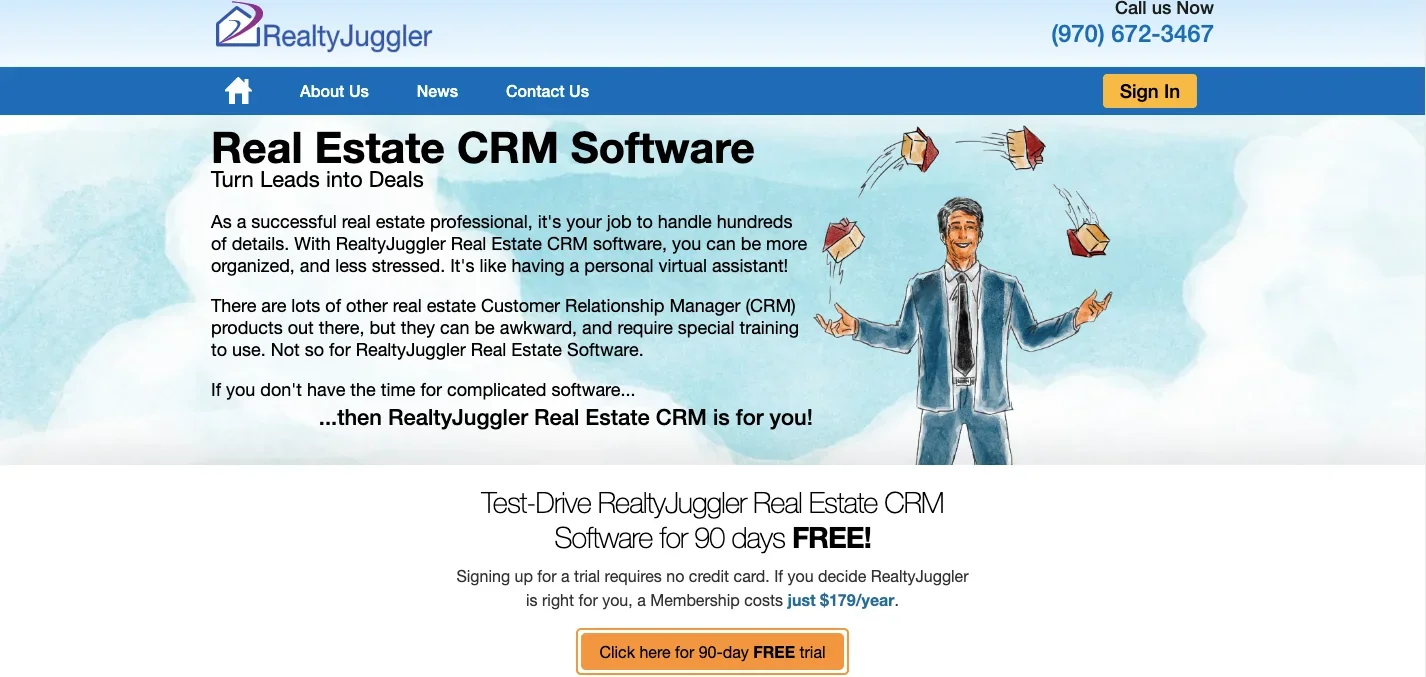
Realty Juggler stays true to its name by allowing real estate agents to juggle hundreds of essential tasks in one place. The platform comes equipped with process and productivity boosters such as:
- Prospect Tracking
- Activity Plan Creation
- Drip Campaign Capabilities
- Automatic Reminders
- Commission Tracking and Calculation
These are just a few core features of Realty Juggler, making it an ideal tool for real estate agents to use for their day-to-day management needs. As a cloud-based software, real estate agents also have the benefit of using the software on any device, including mobile phones, iPads, and Android tablets.
Notable Features of Realty Juggler
- Easy-to-Use: Real estate agents who want to use Realty Juggler can handle the difficult task of a steep learning curve. The CRM platform features an easy-to-understand interface that users can easily jump into and use right away.
- Streamlines Essential Processes: Everything from lead management to commission tracking can be done on Realty Juggler, eliminating the need to purchase and use multiple software to manage day-to-day clients and interactions.
- Cloud-based Solution: Access data on the go through mobile devices and keep your CRM updated no matter how busy your schedule is.
Realty Juggler Price Plans
Realty Juggler offers a 90-day free trial for those interested in trying the platform. After that, the membership plan is priced at $179 per year.
Real estate agents looking to boost their day-to-day productivity do well to try out Realty Juggler. As a solo professional, the platform makes it easy to consolidate and monitor all essential business aspects in one place without having to jump from one platform to another.
4. KVCore by Inside Real Estate - Built To Power an Entire Brokerage
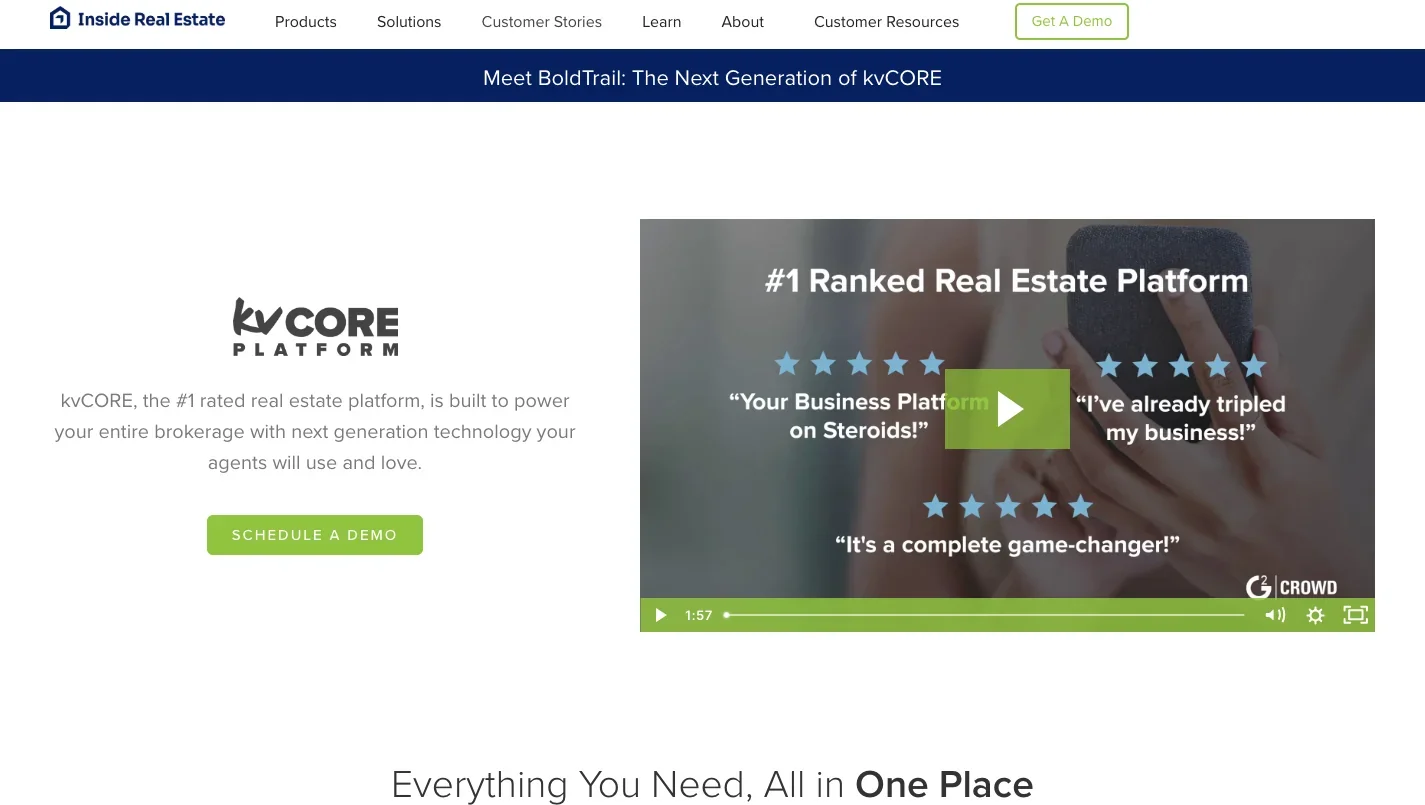
KVCore by Inside Real Estate offers brokerages a CRM platform built for scalability in a fast-paced market. The platform includes all the features and functionalities needed to run high-performance brokerages, such as automated marketing, listing management, leads tracking, and more. The all-in-one platform also creates a seamless user experience by applying an easy-to-use interface.
With KVCore, real estate brokerages can streamline their operations and manage all their crucial data in one location. The robust automation capabilities also make tracking, consolidating, and driving profitability easier. Overall, KVCore offers a premium choice for brokerages looking to expand their team and scale operations faster than they have already established.
Notable Features of KVCore by Inside Real Estate
- Customizable Brand Platform: KVCore allows users to customize their platform to meet branding needs and requirements, making it easier to establish brand credibility within a highly competitive marketplace.
- Automation Across All Segments: Apply automation across all brokerage segments to enhance deal flow and productivity toward preventing pain points and bottlenecks within your system.
- Recruiting & Retention: KVCore comes equipped with premium tools to help your brokerage attract and retain the best talent in the industry, making it easier to grow your team with highly sought-after individuals in the field.
KVCore Price Plans
KVCore offers those interested in testing their platform a free demo. To avail of a free demo, reach out to their team via their website and learn more about the platform. You'll also get an in-depth assessment of how the platform fits into your brokerage.
KVCore is the ideal all-in-one platform for those looking into "What software do real estate agents use." The combination of multiple features and capabilities allows for thousands of possibilities for growing and scaling a brokerage firm in the real estate industry.
Best CRM Software For Real Estate Agents
Regarding what real estate software solutions do real estate agents use, CRM software enhances real estate professionals' customer relationship management, marketing, and sales efforts. Utilizing the best CRM software is essential for real estate professionals. It aids in lead generation, lead nurturing, and sales pipeline management.
Top real estate software tools offer integrated customer relationship management features, contact management, lead capture, and marketing automation tools. This ensures efficient management of new leads and communication with clients, maximizing productivity and sales.
5. Structurely - Lead and Client Interaction Made Easy
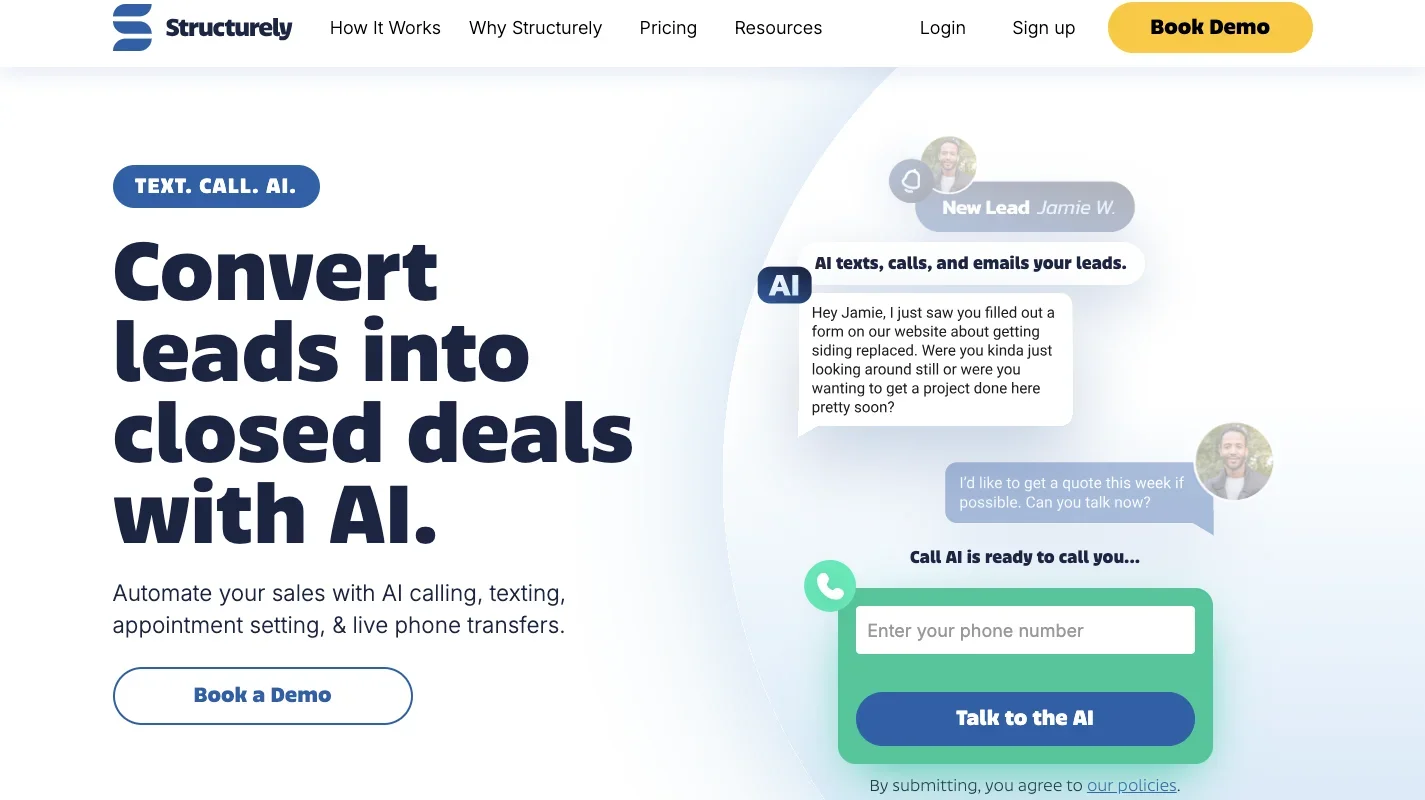
Structurely simplifies the processes of lead and client interaction using AI-powered chatbots that automate lead generation and client communication. The platform's capabilities enable it to handle tasks like answering FAQs, scheduling appointments, and sending follow-ups when necessary.
Structurely uses natural language processing to understand user intent and offer relevant responses. Additionally, it qualifies leads through qualifying questions and insights, making it an essential tool for real estate professionals.
Notable Features of Structurely
- Lead Generation Automation: The platform automates the process of lead generation by capturing potential leads through various channels, such as website forms or social media platforms.
- Client Interaction Management: Structurely streamlines client interactions by scheduling appointments, answering frequently asked questions, and sending follow-ups on behalf of real estate professionals.
- Natural Language Processing: With its advanced natural language processing capabilities, Structurely can understand user intent and provide relevant responses, ensuring a seamless and personalized communication experience.
Structurely Price Plans
Using Structurely, real estate professionals can automate lead generation and client interaction, saving time and effort while maintaining a personalized touch. The platform's advanced features, such as natural language processing and lead qualification.
6. LionDesk - Full Featured CRM Software For Real Estate Agents
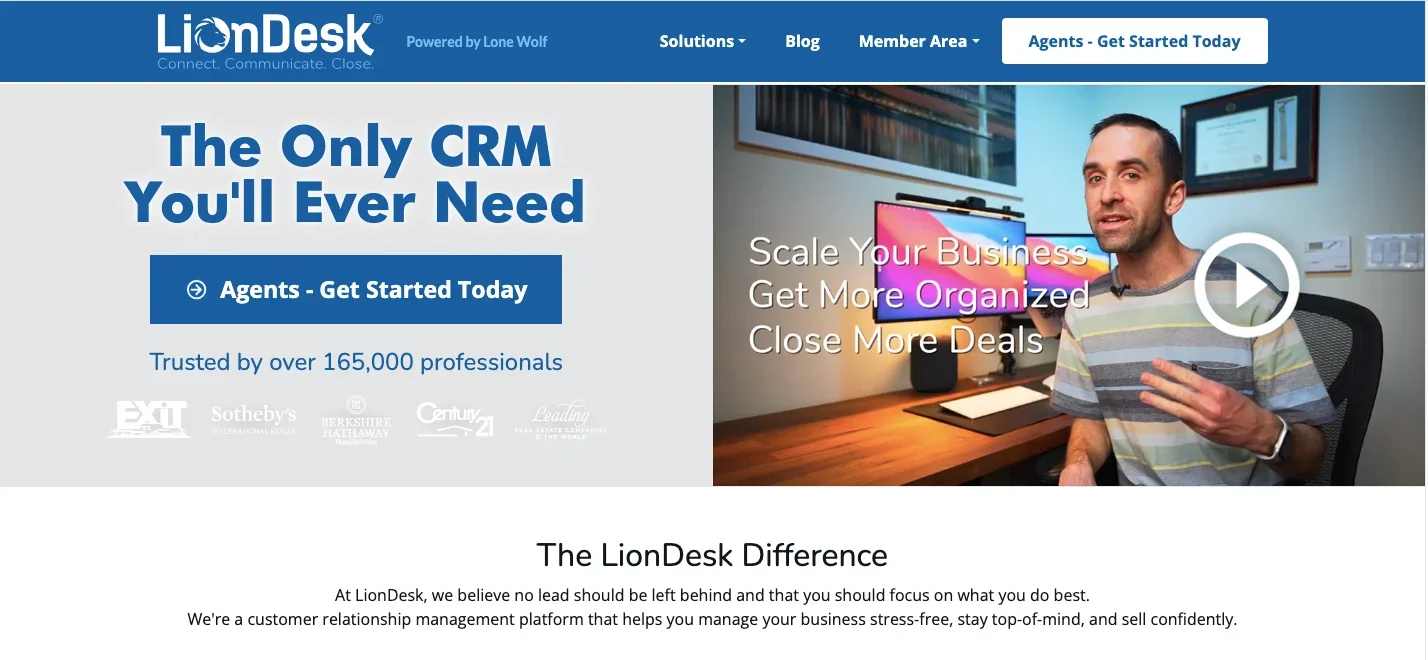
LionDesk, a widely used CRM software among real estate agents, provides essential features such as lead tracking, email marketing, and task management. The platform seamlessly integrates with popular real estate platforms like Zillow, Zaiper, ModernAgent, and more. Additionally, LionDesk offers solutions for individual agents, brokerages, and teams.
No matter your team size, LionDesk enables agents to monitor their sales pipeline and track progress toward their goals. With mobile apps available for iOS and Android, agents can conveniently manage their business while on the move.
Notable Features of LionDesk
- Multiple Integrations: Integrate LionDesk with popular platforms that enable users to streamline their processes and workflow all in one place.
- Comprehensive Client Management: Apply features such as Click to Dial, Texting Manager, and Contact Management to organize your client list and stay connected with prospects.
- Complete List of Features: LionDesk provides individuals and teams with a comprehensive list of features that ease the process, providing end-to-end client management features.
LionDesk Price Plans
LionDesk offers agents and brokers the option to schedule a demo to test their software. While they do not directly disclose their prices on their website, you'll get a breakdown of costs when you apply for a demo.
LionDesk offers individual agents and brokerages the option to consolidate client management and streamline workflow with various features. The software allows real estate agents to track and manage leads efficiently, automate email marketing campaigns, and stay on top of tasks.
7. WiseAgent - Conversational AI Helping To Turn Leads into Appointments
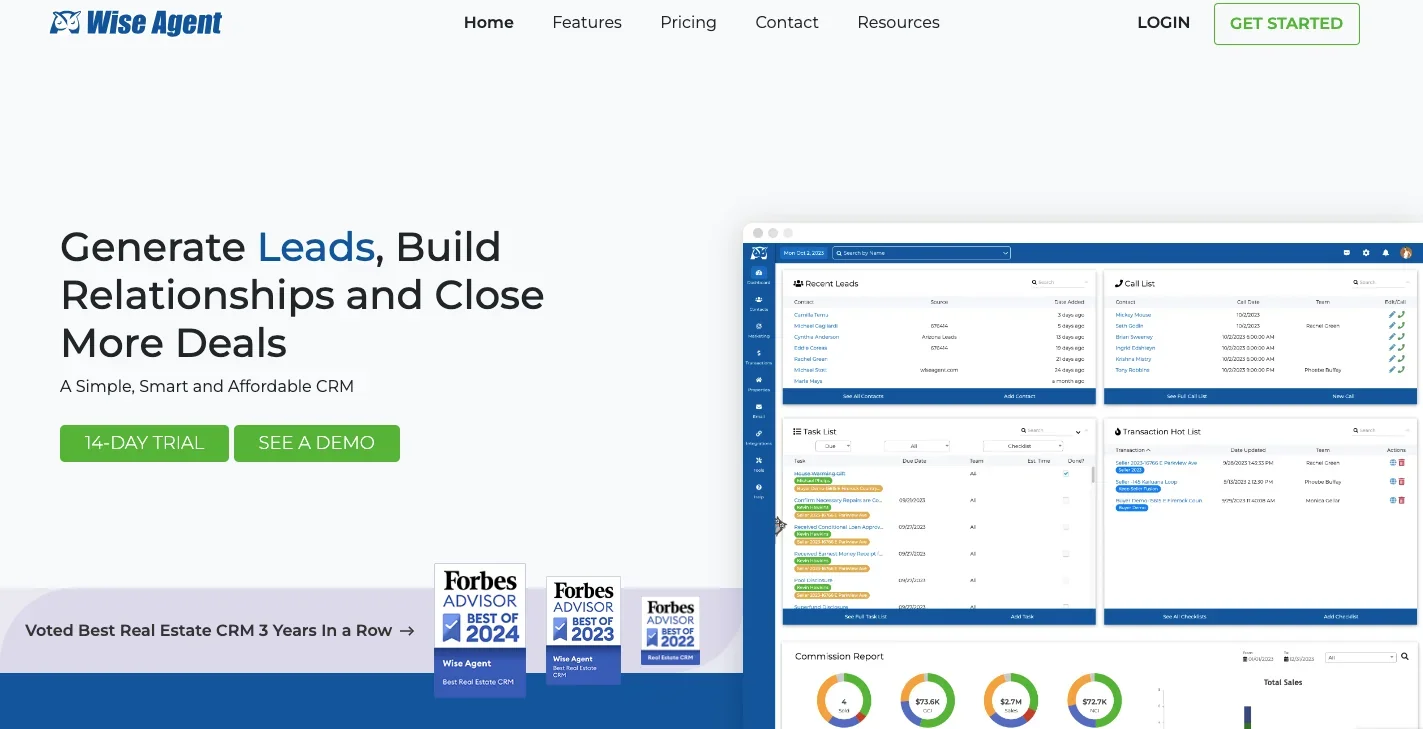
WiseAgent employs Conversational AI to enhance real estate agent efficiency. Boasting features like new lead acquisition and time-saving automation aid in lead generation. Real estate agents benefit from its user-friendly interface, as evidenced by positive testimonials.
Altogether, the main goal of WiseAgent is to ensure excellent time tracking towards productive and efficient real estate agent workflows.
This comprehensive platform offers a wide range of tools and features to help agents manage their client relationships and boost productivity. Agents can easily organize and track leads, schedule appointments, send automated follow-up emails, and access detailed analytics to measure performance.
Notable Features of WiseAgent
- Reporting and Broker Tools: WiseAgent provides robust reporting and broker tools that allow real estate agents to gain valuable insights into their business. Agents can track key metrics, such as lead conversion rates and sales performance, and generate detailed reports to share with clients or their brokerage.
- WordPress Capture Forms: This feature allows real estate agents to easily create customizable lead capture forms that can be embedded on their websites. With these forms, agents can collect valuable client information and generate leads directly from their website.
- Checklist Triggers: Checklist Triggers: Another feature that sets WiseAgent apart is its checklist triggers. Real estate agents can create customized checklists for various stages of the buying or selling process, ensuring that no critical tasks are overlooked.
WiseAgent Price Plans
WiseAgent offers three affordable solutions for the use of their software solution:
- Monthly ($32/month): Ideal for individuals and small teams that require all the necessary features and capabilities of an end-to-end CRM solution. The most affordable and flexible option for those who want to try out the software with no long-term commitment.
- Annual ($326/year): Best for individuals and teams looking to streamline and scale their operations in the long term.
- Enterprise (custom pricing): Ideal for large teams and brokerages that require advanced customization and scalability options. The enterprise plan offers tailor-made pricing based on the business's specific needs.
WiseAgent is a great, full-featured CRM solution for small teams and brokerages in the real estate industry. Its user-friendly interface and powerful features make it a go-to software for many real estate agents.
Best Property Listing Software for Real Estate Agents
Streamlining property management, listing, and lead generation, property listing software offers features like lead capture, contact management, and integrated CRM tools. Real estate professionals benefit from market reports, predictive analytics, digital marketing, and social media posts. The software enables ease of use, contact lists, and content creation, supporting efficient property listing and sales.
8. Property Base - Create Stunning Property Listing Websites
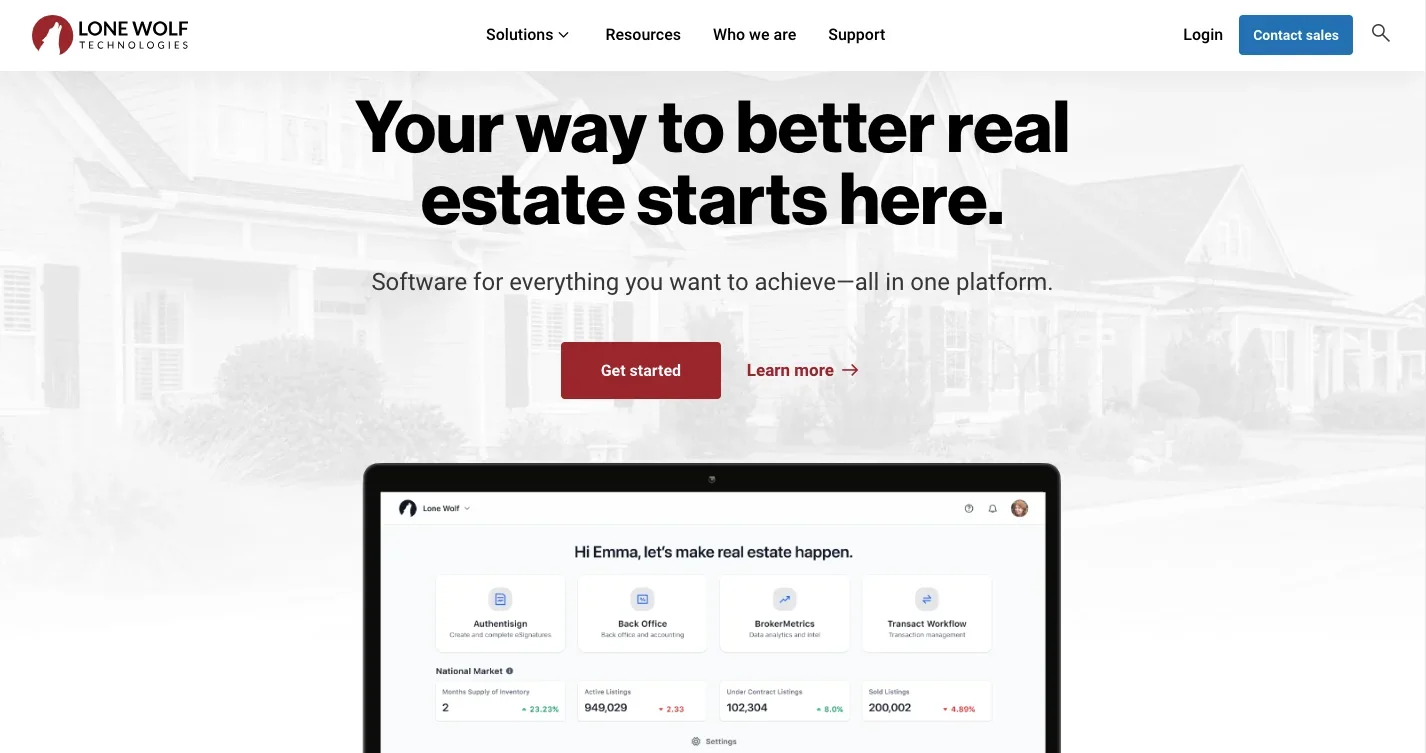
Property Base offers a range of features, including property management, lead nurturing, and marketing automation tools. The platform provides integrated real estate websites, market leader, and sales pipeline features.
Additionally, it includes customer relationship management, free trial, and contact information management. With its artificial intelligence, Propertybase ensures potential clients are targeted at the right time, making it an excellent choice for real estate professionals seeking ease of use and different lead sources.
Notable Features of Property Base
- Brokerage and Agent Websites: Create SEO-optimized listings using pre-designed templates and customizable branding options. Showcase properties with stunning visuals, virtual tours, and interactive maps.
- Lead Management: Capture leads from various online sources, such as websites, social media, and advertising campaigns. Organize leads, track interactions, and automate follow-ups to increase conversion rates.
- Marketing Automation: Automate marketing campaigns with personalized emails and messages. Use drip campaigns to nurture leads and stay top-of-mind with potential clients.
Property Base Price Plans
Property Base allows potential users to apply for a demo via their website. Property Base is a comprehensive software solution for real estate agents that combines property listing websites, lead management, and marketing automation tools. Its user-friendly interface and customizable features make it a top choice for real estate professionals.
In addition to the features mentioned, Property Base also offers brokerage and agent websites optimized for search engines. With pre-designed templates and customizable branding options, agents can create stunning listings that attract potential buyers. These websites showcase properties with high-quality visuals, virtual tours, and interactive maps, providing a seamless browsing experience for clients.
9. ShowingTime - Responsive Showing Scheduling Solution
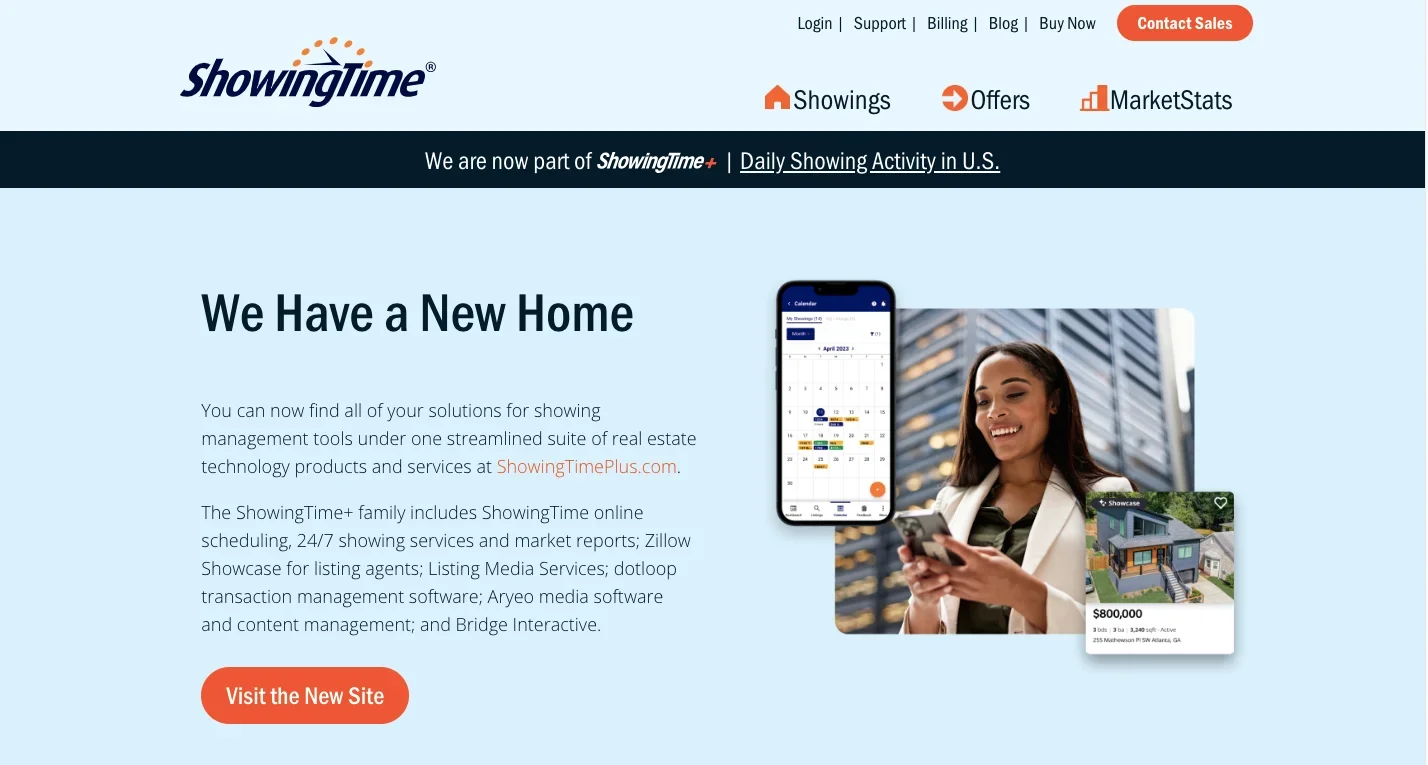
ShowingTime is a comprehensive showing management tool ideal for real estate agents and firms, regardless of team size. ShowingTime is a responsive showing scheduling solution that streamlines the process of managing property showings for real estate agents and firms. With its user-friendly interface and robust features, ShowingTime caters to teams of all sizes.
One of the key advantages of using ShowingTime is its ability to simplify the scheduling process. Real estate agents can easily create and manage showing appointments, eliminating the need for time-consuming back-and-forth communication with buyers and sellers. ShowingTime also integrates with popular calendar systems, such as Google Calendar, ensuring that agents have a centralized view of their schedule.
Notable Features of ShowingTime
- Quick Scheduling and Confirmation: ShowingTime allows real estate agents to schedule and confirm property showings quickly, saving them valuable time and reducing the chances of double bookings.
- Offer Management Tool:: ShowingTime also provides offer management tools, allowing real estate agents to manage and track offers from potential buyers efficiently. Agents can quickly review and compare offers, communicate with clients, and keep all relevant information organized in one place.
- Custom MarketStats: ShowingTime offers custom MarketStats, which helps real estate agents analyze local market trends and provide accurate data to their clients. This feature allows agents to access detailed reports on property values, sales trends, and market activity in specific areas.
ShowingTime Price Plan
ShowingTime does not directly disclose its price plans on its website. However, those interested in using the software should reach out to their sales team on their website for a detailed breakdown of plans and how to get started.
ShowingTime is the ideal solution for real estate agents looking for premium software for listing, scheduling, and confirming showtime appointments. Whether you are a seasoned real estate agent or just starting out in the industry, having efficient software can make a significant difference in your productivity and client satisfaction.
Must Have Features When Considering What Software Do Real Estate Agents Use
Leaning into the question, "What software do real estate agents use?" also means considering the vital features a solution should have. Today, the real estate market trends lean towards improving client interaction and simplifying the overall process of finding and closing real estate deals.
With that being said, here are 6 must-have features of any real estate software, whether used for a team of agents or an individual professional:
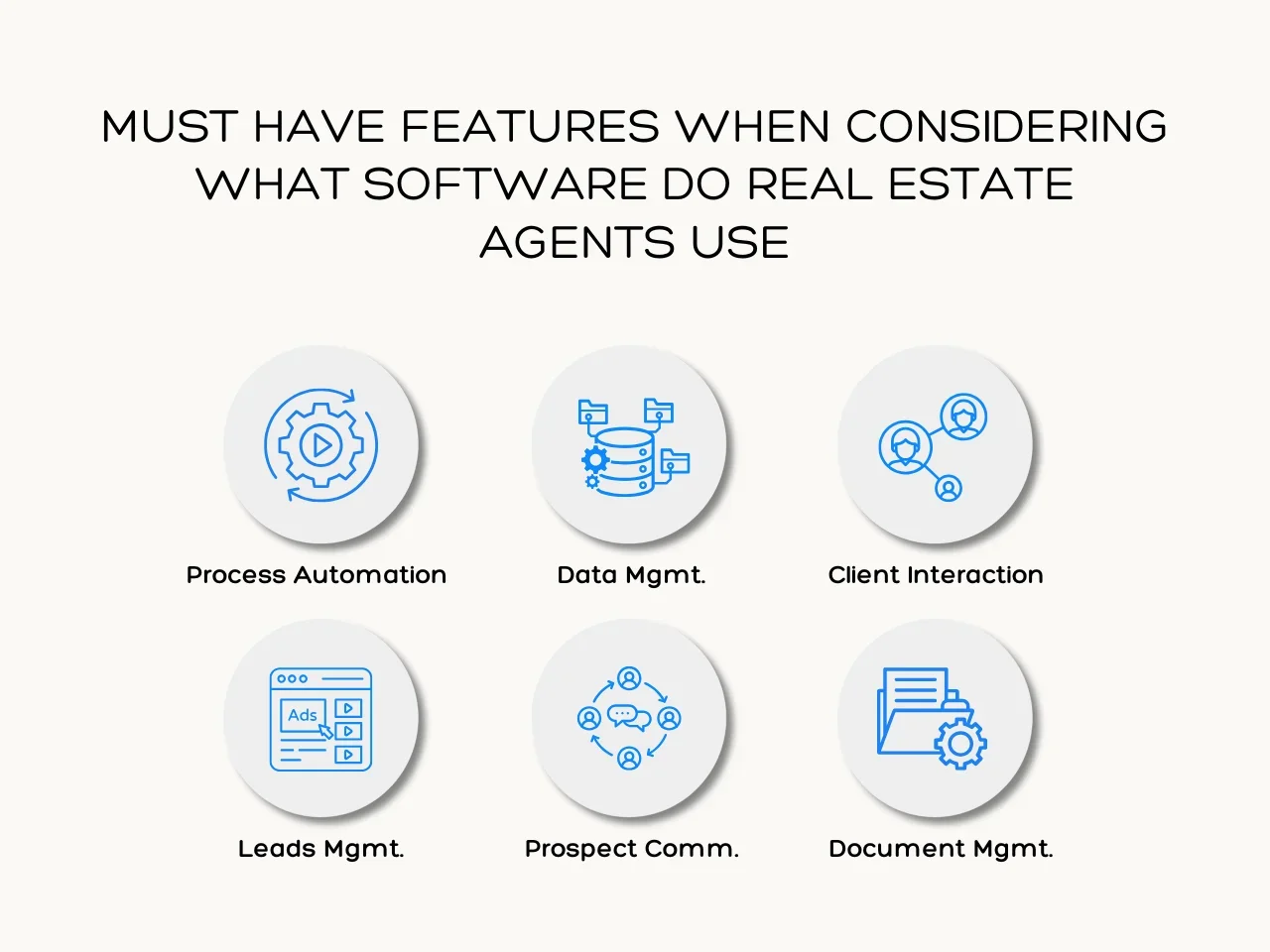
Process Automation
Streamlining real estate transactions process automation eases lead capture, management, and nurturing. Optimization of the sales pipeline through automated tools enhances software solutions.
Automated marketing aids in content creation, while contact management tools facilitate lead nurturing. Integrating process automation features offers an efficient solution for real estate professionals, leveraging new leads and maximizing productivity.
Data Management
Efficiently managing data is vital for real estate professionals. The right software organizes and analyzes real estate data seamlessly. It maintains accurate property information, client details, and market trends for better decision-making.
Features such as data import, export, and security measures ensure streamlined processes for tracking property transactions, client interactions, and lead sources. This ensures a well-maintained database and facilitates informed business decisions.
Client Interaction
Real estate professionals rely on client interaction software to seamlessly communicate with clients, leads, and potential buyers. This software facilitates efficient appointment management, property showings, and open houses.
Features like automated communication, personalized messaging, and client relationship management enable effective client feedback, relationship nurturing, and lead generation. Nurturing new leads and managing client interactions are essential for real estate brokerages, making top producer platforms like KVCore and RealGeeks a go-to choice when asked, "What software do real estate agents use?".
Leads Management
Streamlining lead management for real estate professionals is essential for maximizing productivity. Enhancing marketing efforts with lead capture, nurturing, and generation software is vital in today's competitive market. Integrated solutions offering Google ads, online ads, and lead gen tools optimize lead management. Features like contact management and marketing automation tools ensure efficient processes. Additionally, ensuring ease of use, different lead sources, and content creation tools are crucial for effective lead management.
Prospect Communication
Real estate professionals leverage software tools to enhance communication with prospects, clients, and leads. These tools offer contact management, lead capture, and marketing automation features, including Google ads, online ads, and lead gen tools for effective lead nurturing.
Integrated solutions streamline lead capture, nurturing, generation, and sales pipeline management, empowering professionals with ease of use, various lead sources, and content creation tools to optimize lead management.
Document Management
Efficient real estate software solutions support document management and organization, offering storage, data security, and sharing features. These tools streamline property transactions, client interactions, and lead tracking.
They also assist in managing property information, client details, and market trends for optimized decision-making. Document management solutions provide data import, export, and security measures for streamlined processes.
How to Choose the Right Software for Your Real Estate Business
When choosing software, aligning it with your business goals and ensuring seamless integration with existing tools is important. Look for ease of use and scalability, along with robust customer support and training options. Data security and compliance should also be top priorities. By considering these factors, real estate professionals can make informed decisions:
- Understanding Your Business Needs: Understanding your business's pain points and areas for improvement is crucial. Identifying the specific features and tools necessary for your team's workflow and processes is essential.
- Ease of Use: Look for software that is intuitive and user-friendly. Your team should be able to easily navigate through the various features and functionalities without any technical difficulties.
- Scalability: Consider the long-term growth of your real estate business. Choose a software solution that can scale with your growing business needs. This means looking for software that can handle increasing clients, transactions, and data without compromising performance or creating bottlenecks.
- Diverse Lead Sources: The software you choose should offer a wide range of lead sources to help you generate new business opportunities. Look for features that allow you to manage leads from multiple channels, such as websites, social media platforms, and referral networks. Access to diverse lead sources can significantly enhance your chances of finding potential clients and closing deals.
- Predictive Analytics: Another important factor to consider when choosing software for real estate agents is the inclusion of predictive analytics. This feature can significantly enhance your decision-making process by providing valuable insights and forecasts based on historical data.
- Mobile Compatibility: In today's digital age, it is crucial that your software solution offers mobile compatibility. Being able to access and manage your real estate tasks on the go can greatly increase productivity and efficiency.
Key Takeaway
There are several software options available when it comes to what software real estate agents use. From comprehensive CRM solutions like Real Geeks and Realty Juggler to property listing software like Property Base and Showingtime, a range of choices cater to different needs.
When choosing software, it's essential to consider factors such as your business needs and the features offered by the software. The future of software in real estate looks promising, with predicted trends indicating advancements in automation, artificial intelligence, and data analytics. By embracing the right software tools, real estate agents can stay ahead of the curve and succeed in their business endeavors.
If you’re ready to explore custom software solutions for real estate, reach out to our team at [email protected], where our Account Executives can walk you through the process of developing the ideal solution for your specific needs.

